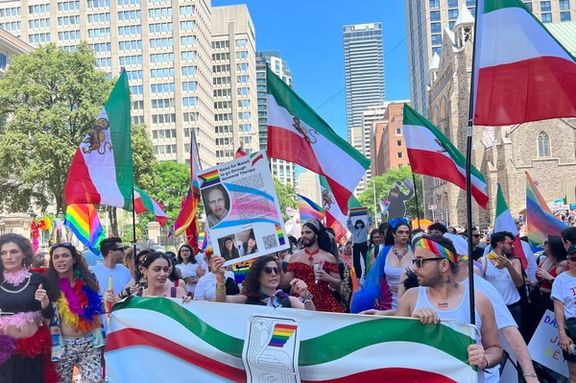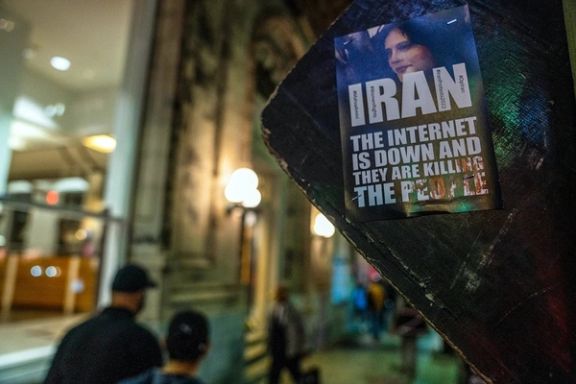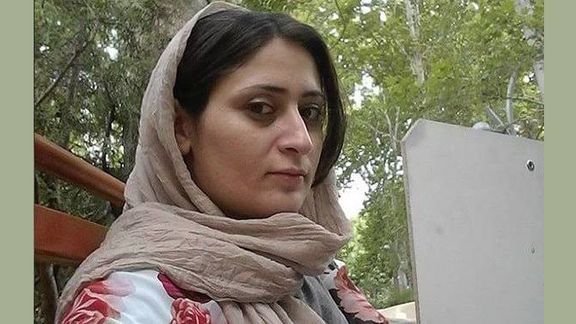Iranian LGBTQ Activists Call For Protests On Amini Anniversary

Iranian LGBTQ activists have endorsed worldwide protests on September 16 to commemorate the death of Mahsa Amini.

Iranian LGBTQ activists have endorsed worldwide protests on September 16 to commemorate the death of Mahsa Amini.
In a joint statement, activist groups such as Simorgh, Six Colors, the Iranian Rainbow Coalition, and the Queer Rights Group claim that the current revolutionary wave holds the potential to secure the liberation and equality of the rainbow community in Iran, marking the end of centuries of discrimination and prejudice, including to the country's LGBTQ community.
They have called on political and social groups, both within and outside of Iran, to join in anti-regime protests.
Since the inception of the Women, Life, Freedom uprising, the Iranian LGBTQ community has been at the forefront, articulating their vision for a post-Islamic Republic Iran through active participation in both domestic and international protests.
Despite the many challenges faced by LGBTQ individuals in Iran, they continue to confront dangers, including the risk of execution and other forms of punishment under the laws of the Islamic Republic.
Iranian authorities have resorted to derogatory labels and stigmatization when addressing LGBTQ citizens, referring to them as "deviant" and "sick", same sex relations forbidden in Islamic laws.

For the second consecutive night, Iran has experienced a significant disruption to its internet services, the nation's connectivity plummeting to 71% of its standard levels during the latest outage.
The development follows a consistent trend of internet restrictions within Iran, with the government exerting more pressure to quash anti-regime sentiment online, particularly relating to raising momentum for further protests in the coming days as the anniversary of Mahsa Amini's death nears.
Over the past two decades, Iran has imposed strict censorship measures on internet access, limiting citizens' ability to freely obtain information. This encompasses the blocking of numerous foreign and domestic websites, including reputable news outlets. However, these restrictions have been circumvented through the widespread use of Virtual Private Networks (VPNs) and anti-filtering software.
Recent months have witnessed a more aggressive push by hardliners in the Iranian parliament to ratify legislation that would further restrict access to social media and the internet. Additionally, reports have circulated regarding plans to launch a domestic intranet, enabling authorities to exercise greater supervision over its content.

Iranian Women's Rights Activist Atefeh Rangriz was arrested and sent to Semnan Prison, 200 km from Tehran.
According to reports from the Iranian Women's Association's Telegram channel, Rangriz managed to convey this distressing news to her relatives during a brief phone call from prison.
Rangriz's initial arrest took place on May 1, 2019, during a demonstration on International Workers' Day in front of the parliament, where she was protesting alongside a group of fellow activists.
Following her arrest, Rangriz was held in solitary confinement in section 209 of Tehran's Evin prison for several weeks. During the period, she was denied any contact with her family and endured intensive interrogations without legal representation. She was coerced into confessing to allegedly planning protests deemed a threat to national security.
After weeks of interrogation by intelligence officials, Rangriz was brought before the prosecutor's office within Evin prison. She faced a series of charges, including "gathering and colluding against national security," "spreading propaganda against the system," "disrupting public order," and "insulting officers on duty."
While some detainees were eventually released, individuals like Atefeh Rangriz and journalist Marzieh Amiri received prison sentences. Rangriz was initially sentenced to 11 years and six months in prison, along with 74 lashes, in a summary trial. However, her sentence, along with those of other labor activists and protesters from the International Workers' Day demonstration, was later pardoned in the subsequent year.
The exact reasons behind Rangriz's detention remain shrouded in mystery but is one of a number of rearrests of protesters and opposition figures in the lead up to the anniversary of Mahsa Amini's tragic death.

The head of the Mazandaran Provincial Judiciary has announced the closing of 12 schools and educational centers in the northern city of Babol on charges of "promoting Baha'i Faith".
Mohammad Sadegh Akbari further stated that "Baha'i instructors from three cities in the country were providing education and training on their beliefs to promote Baha'ism." As a result, intelligence forces have detained and imprisoned two individuals considered prominent Baha'i instructors in Iran.
Akbari added that in the sealed educational centers in Babol, "a number of books and brochures related to the Baha'i Faith" were confiscated.
The statements by the head of the Mazandaran Judiciary come at a time when, in recent months, there has been a widespread wave of summoning and detaining Baha'i citizens in Iran. The crackdown is happening simultaneously with an escalation of government pressure on various segments of society and political groups following the nationwide protests in 2022.
The Shia clergy consider the Baha'i faith as a heretical sect. In Iran, the Baha'i community, numbering around 300,000, faces systematic persecution, discrimination, and harassment. They are barred from holding public sector jobs and are sometimes dismissed from their private sector employment under pressure from authorities.
During the recent crackdown on Baha'is in Iran, security authorities detained nine Baha'i citizens in Tehran and confiscated 40 Baha'i homes and warehouses belonging to them.
Security authorities in Iran have repeatedly applied pressure on citizens who practice the Baha'i Faith, using various pretexts and security reasons, and have seized or confiscated their properties on multiple occasions.

The family of a Swedish EU employee detained in Iran has urged the international community to help secure his release.
"The family, friends, and supporters of Johan are calling for urgent international attention to secure his immediate release and safe return to Europe," Johan Floderus' family wrote on a website dedicated to his release, on his 33rd birthday, on Sunday.
The European Union's top diplomat Josep Borrell said on Tuesday that Floderus' case had been raised repeatedly with authorities in the Islamic Republic.
His family said Floderus was being held more than 500 days for alleged spying without formal charges at Tehran's Evin prison, where political prisoners and many detainees facing security charges, including Iranians with dual nationality, are jailed.
His family said Floderus had travelled throughout the Middle East to study languages, explore historic sites and to support humanitarian cooperation projects in Iran on behalf of the EU, and was arrested in April 2022 before leaving the country.
"His needs for adequate food rations, outside walks, medical checkups and much more are not respected (in jail)," they said, adding that he had been denied "communicating" with Sweden's embassy in Tehran, except a few consular visits.
They said that starting in February 2023 Floderus was restricted to making short phone calls once a month. "He had to go on hunger strike to be allowed to make several of these calls, which have to be in English and monitored."
(With reporting by Reuters)

As the Iranian parliament is preparing to vote on a strict hijab law, an official has said that hijab is more than a cultural issue and has “political and security” dimensions.
The parliament is expected to vote soon on a draft law that was crafted to increase a variety of punishments for women who appear in public without observing the full requirements of the government dress code. The measures include hefty cash fines, denial of public services to women without hijab, and even prison for repeat offenders.
Abdol-Hossein Khosropanah secretary of the Islamic Republic’s Supreme Cultural Council said Saturday that hijab serves the interests of the Islamic society and “the Muslim ruler” must make it mandatory.
Many Iranian women have stopped wearing the hijab after nationwide protests following Mahsa Amini’s death in the custody of the morality police in September 2022.
For a few months, authorities did not act against the phenomenon, afraid of inflaming the public and triggering more protests. However, since January they have begun a full campaign to enforce the dress code. Parliament’s draft law is the latest measure to force women to wear the hijab.
Many clerics and hardline members and supporters of the regime argue that the fate of the Islamic Republic depends on enforcing hijab, and if women are allowed to act as they wish it would weaken the foundations of clerical rule.






